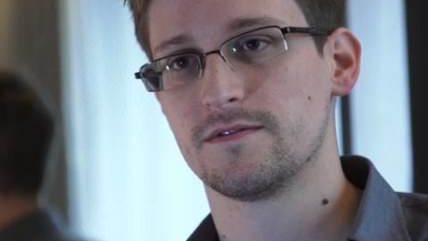NSA Whistleblower Comes Forward, Says 'I Don't Want To Live In a Society That Does These Sort of Things'


The whistleblower behind the past week's revelations about U.S. government snooping on telephone calls and the Internet is 29-year-old Edward Snowden, a systems analyst who once worked for the Central Intelligence Agency and now (well, probaby not anymore) works for a defense contractor with access to intelligence documents (Booz Allen confirms his employment and expresses dismay). He has voluntarily allowed the Guardian and the Washington Post to reveal his identity in order to explain himself, and in full expectation that the Obama administration and intelligence services will come after him. In his interviews with those newspapers, he comes off as a disillusioned patriot who has grown horrified by the growing security state and the danger it poses to privacy and liberty. "I don't want to live in a society that does these sort of things," he told the Guardian.
From the Guardian:
In 2003, he enlisted in the US army and began a training program to join the Special Forces. Invoking the same principles that he now cites to justify his leaks, he said: "I wanted to fight in the Iraq war because I felt like I had an obligation as a human being to help free people from oppression".
He recounted how his beliefs about the war's purpose were quickly dispelled. "Most of the people training us seemed pumped up about killing Arabs, not helping anyone," he said. After he broke both his legs in a training accident, he was discharged.
After that, he got his first job in an NSA facility, working as a security guard for one of the agency's covert facilities at the University of Maryland. From there, he went to the CIA, where he worked on IT security. His understanding of the internet and his talent for computer programming enabled him to rise fairly quickly for someone who lacked even a high school diploma.
By 2007, the CIA stationed him with diplomatic cover in Geneva, Switzerland. His responsibility for maintaining computer network security meant he had clearance to access a wide array of classified documents.
That access, along with the almost three years he spent around CIA officers, led him to begin seriously questioning the rightness of what he saw. …
Over the next three years, he learned just how all-consuming the NSA's surveillance activities were, claiming "they are intent on making every conversation and every form of behaviour in the world known to them".
Like many Americans, he nursed hope that the election of Barack Obama would rein in the growth of the surveillance apparatus, but instead he "watched as Obama advanced the very policies that I thought would be reined in."
The Washington Post adds:
Asked whether he believed his disclosures would change anything, he said: "I think they already have. Everyone, everywhere now understands how bad things have gotten— and they're talking about it. They have to power to decide for themselves whether they are willing to sacrifice their privacy to the surveillance state."
Snowden also expressed the hope that the NSA surveillance programs would now be open to legal challenge for the first time. Earlier this year, in Amnesty International V. Clapper, the Supreme Court dismissed a lawsuit against the mass collection of phone records because the plaintiffs could not prove exactly what the program did or that they were personally subject to surveillance.
"The government can't reasonably assert the state secrets privilege for a program it has acknowledged. The courts can now allow challenges to be heard on that basis," Snowden said.
Snowden is currently holed up in Hong Kong and plans to seek asylum in "countries that believe in free speech and oppose the victimization of global privacy." Iceland is mentioned as a possibility.
In the wake of Snowden's revelations, politicians and intelligence agency bureaucrats have sought to justify the wide-reaching surveillance as necessary to battle terrorism. But journalists have already pointed out that the one specific case mentioned, a 2009 bomb plot targeted at the New York subway system, was actually foiled by traditional police work.
Director of National Intelligence James Clapper calls the revelations "literally gut-wrenching." Let's hope he's in for some serious continuing heartburn as Snowden's efforts are followed-up upon with efforts to cripple the surveillance state.
The Guardian has a video interview with Edward Snowden here.
More Reason coverage of the NSA scandal and reactions to the surveillance revelations can be found here.
(H/T Mike M.)


Show Comments (182)